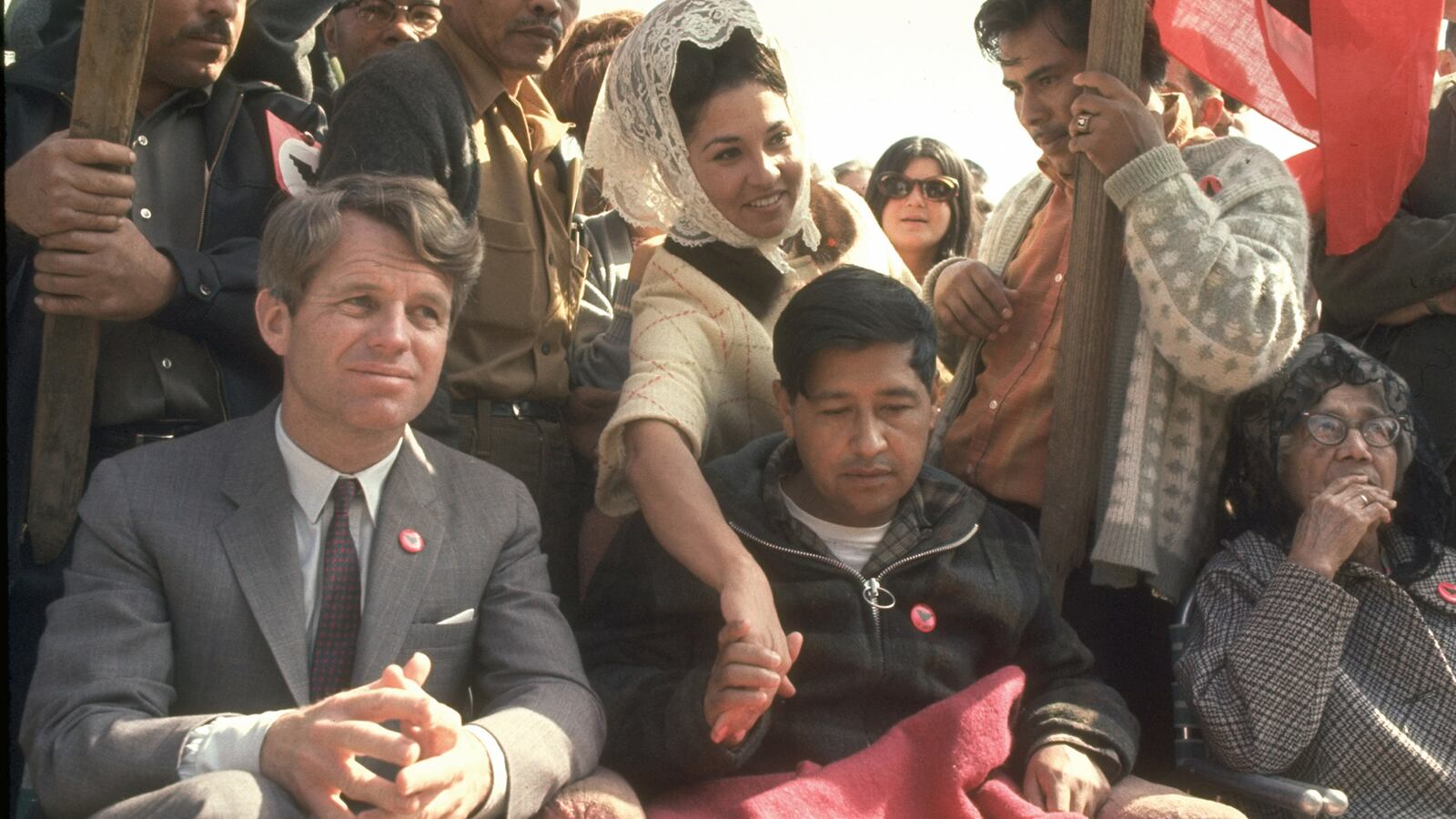Fifty years ago on a hot Sunday afternoon in late July, I stood in the back of a packed hall on the Kern County Fairgrounds in Bakersfield, California, and listened to Cesar Chavez deliver a speech as memorable to me today as when I first heard it.
At the time, I was the newest member on the organizing staff of Chavez’s United Farm Workers. The union was about to launch the strike against the Giumarra Vineyards Corporation that the country would soon know as the California grape boycott. The speech was a crucial step in rallying workers unused to striking.
Today when we think of 1967, we remember the cultural breakthroughs epitomized by the Summer of Love and the Beatles’ Sgt. Pepper album, but in 1967 Cesar Chavez and the Farm Workers had a gritty celebrity of their own. With his fasts and his Gandhi-like commitment to nonviolence, Cesar drew constant media attention. No other union had its labor disputes so widely followed, its leadership more closely documented.
Agricultural workers were—and still are—excluded from the protections of the National Labor Relations Act, and a union representing them brought with it a special kind of hope.
As I listened to Cesar speak, I was struck by his calmness. There was no shouting, no promising a quick victory. He spoke only in Spanish that afternoon, and the farm worker standing next to me translated whenever I needed him to.
At the heart of Cesar’s speech was the story he told of a grower who decades earlier had his employees terrified because of his skill with a whip. The grower, it was said, could flick the ashes off a man’s cigarette with his whip, and nobody wanted to defy him.
One day one of his workers noticed a bee buzzing around the grower’s head and asked him why he didn’t use his whip to kill the bee. The grower, Cesar went on to say, just smiled. Then he said, “Bees are different from anything I’ve whipped before. If you go after one, they all come after you.”
Cesar paused at this point. “That is what the union means,” he said. “The union is like the bees. The man with the whip is like the grower. He cannot do anything to one of us without having all of us come after him.”
I remember the applause that came when Cesar finished speaking, but I also remember the applause did not come immediately. Everyone in the room wanted, it seemed, a second to take in what he had just said. It was like hearing one of Aesop’s fables for the first time.
What made Cesar’s story so powerful was that it was consistent with the scale on which the Farm Workers operated at that time. Those of us on the organizing staff had two principal ways of reaching Giumarra workers. We visited them in their homes after work, and we kept them up to date on what the union was doing by passing out El Mosquito Zumbador (The Buzzing Mosquito), a one-page, Spanish and English flyer.

Labor rights leader Cesar Chavez (third from right) and Coretta Scott King (fourth from right) leading a lettuce boycott march down a street in New York City.
Bob Parent/Hulton Archive/GettyIn June and early July, I had watched Cesar speak with small groups of Giumarra workers. At those meetings, typically held in someone’s home, he spent most of his time listening to the workers’ complaints about the company. The workers had expected Cesar would do most of the talking, but in short order men who had never met him before thought of him as a friend and opened up to him.
For Cesar, that emphasis on hearing out others was crucial to making the Farm Workers a success. In 1967 the union had also made itself distinct by its internal composition. The civil rights movement had become increasingly divided along black-white lines by the mid ’60s, but the Farm Workers chose to go in the opposite direction.
The union’s most visible leadership positions reflected its Latino base, but within the union, white staffers played key roles and were treated as integral to the union. Without them, the union would not have had the organizing strength or the legal department it did.

Portrait of United Farm Workers leader Cesar Chavez w. pictures of Kennedy and Gandhi in background.
Arthur Schatz/The LIFE Picture Collection/GettyIt took three years before the California grape boycott ended in a Farm Worker victory that for a time changed the prospects for agricultural labor in America. Few of us in that meeting hall in Bakersfield imagined so lengthy a boycott or knew what it would take to build political support across the country. In the end, determination proved more important than planning.
When I look back on the Farm Workers movement that I was part of in the late ’60s and early ’70s, I am filled with nostalgia as well as regret that the achievements of those years have not been sustained. The nostalgia I feel is not, though, the sentimental kind that says this time was the Farm Workers’ Camelot and as such belongs to an irretrievable past.
The success of the Farm Workers in the years when everyone knew about the California grape boycott was not magical. The union triumphed because it relied on constant organizing, a diverse staff, and a refusal to be intimidated by the power and wealth of the growers it faced. What the union’s history from those years really offers us is a blueprint for dealing with the present, when agricultural laborers remain among the most vulnerable workers in America.
Nicolaus Mills worked for the United Farm Workers as a volunteer in the late ’60s and early ’70s. He is author of Winning the Peace: The Marshall Plan and America’s Coming of Age as a Superpower.






